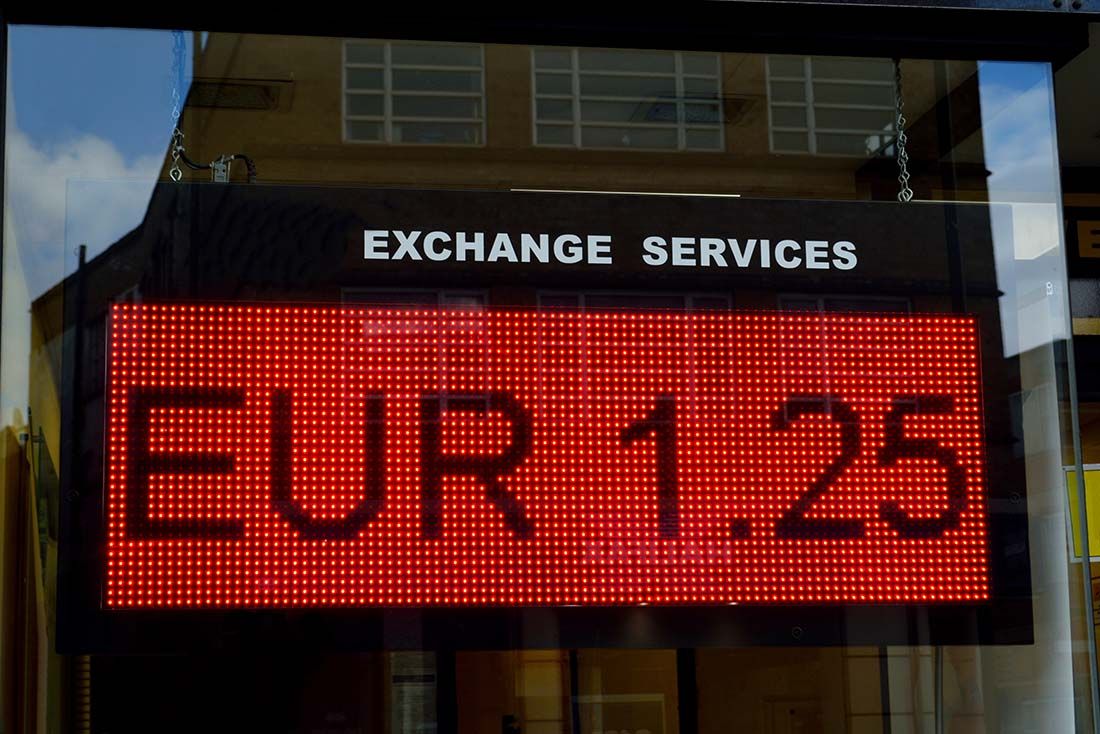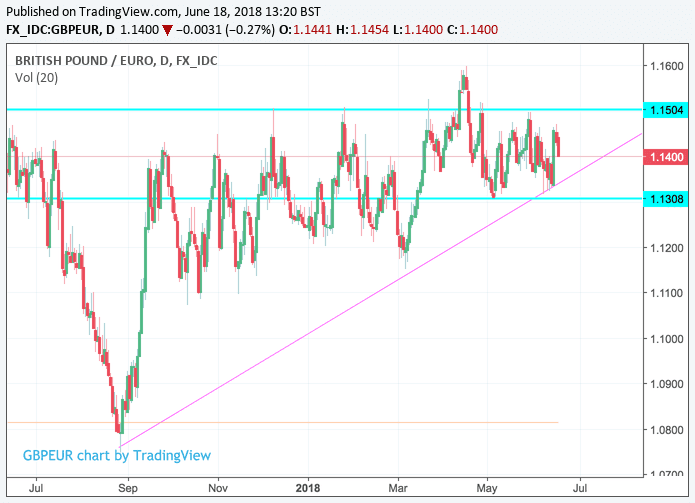British Pound vs. Euro: "Downside Risk Looks Limited"
- Downside risks to the Pound appear limited
- But gains beyond 1.1500 into mid-year unlikely

Image: © Savo Ilic, Adobe Stock
It's been a poor week thus far for Pound Sterling which is nursing a loss against the Euro having moved from a weekly open of 1.1452 to register 1.1372 at the time of writing.
However, the Euro is yet to recapture all the losses it suffered against Sterling on Thursday, June 14 and the latest assessment of the GBP/EUR exchange rate from Trevor Charsley - an analyst with foreign payments specialists AFEX - suggests downside risks to the British Pound against the single currency should be relatively limited.
That being said, the same analysis also confirms upside potential in Pound Sterling is likely to remain limited and those with sizeable international payments would do well to secure a rate in the 1.15 region.
In a recent note to clients, Charsley observes "the shallow recovery sequence apparent since Q4 last year continues to guide GBP price activity going into the end of Q2 2018 with values currently pivoting their effective 1.1450 mid-point while attention remains focused elsewhere."
Indeed, the GBP/EUR exchange rate appears to be dancing a sideways jig at the current juncture with a good dose of political risks in both the Eurozone and United Kingdom keeping the exchange rate on a stable footing.
Brexit-related risks in the UK remain elevated with the passage of the European Union (Withdrawal) bill forming the focus for Sterling this week and analysts reckon the currency is unlikely to find a substantive bid until the bill gains Royal Ascent and enters the statute books.
The Euro has meanwhile finally moved beyond Italian political jitters, to be met by news that the stability of Angela Markel's ruling CDU/CSU/SDP coalition is being questioned thanks to a rift over immigration policy between the CSU and Merkel's own CDU which are typically staunch allies.
The Euro exchange rate complex could therefore remain under pressure, and this is seen to be reflected in the charts. "Provided secondary demand in the 1.1250 area contains emergent weakness downside risk looks limited," says Charsley.
Nevertheless, should Sterling find a strong bid, we are told gains will likely remain limited so sitting back and waiting for the Pound to run higher is unlikely to yield any significant dividends for those looking to buy Euros in the near future.
Above: Sterling-Euro price action suggests the longer-term trend is higher while shorter-term the market is restricted to a sideways move.
"Even if a bullish resolution could be engineered first/next instead upside potential also appears restricted going forwards given selling pressure beginning around 1.1550 then 1.1650 zones," says Charsley.
Therefore those looking to transact in GBP/EUR should be aware that 1.15 in the current market represents excellent value.
Advertisement
Get up to 5% more foreign exchange by using a specialist provider to get closer to the real market rate and avoid the gaping spreads charged by your bank when providing currency. Learn more here.
Sterling: Mid-Week Risks Eyed
The British Pound could remain an under-performer through the mid-week period as domestic political risks remain a focus for foreign exchange markets.
The UK government's flagship Brexit bill - The European Union (Withdrawal) Bill - is back for debate at the House of Commons on Wednesday, after the House of Lords failed to rubber-stamp the bill and ensure for Sterling uncertainty remains rife. The return of the bill to the elected chamber of Parliament presents yet another danger-point for the Prime Minister who continues to struggle to unify her party around the government's official position regarding Brexit.
Peers in the upper chamber sent the bill back to the House of Commons, demanding legislators include amendments that allow for MPs to vote on how the government should proceed if there is no Brexit deal by 21 January 2019.
Peers backed the amendment to the EU Withdrawal Bill by 354 to 235, a majority of 119.
There were 22 Conservative rebels who voted in favour of the amendment, including Tory former deputy prime minister Lord Heseltine and Conservative former ministers Lord Patten of Barnes, Lord Willetts and Baroness Warsi.
The bill will now go before the House of Commons again and the government must either negotiate changes to the bill - that accounts for their stance and the stance of the Lords - or send the bill back to the Lords in its current format in a rebuke to the demands of the unelected body.
And with members of her own party threatening to vote against the government, there is clearly political risk involved for May and her government should she fail to get her way with suggestions that the government could ultimately fall if there is a failure to pass the legislation.
"UK PM May risks another defeat with potentially big political consequences," says Piet Lammens, an analyst with KBC Markets in Brussels.
For foreign exchange markets the issue is important as it poses continued political uncertainty; something Pound Sterling despises.
"Speculators who are long sterling may be in for additional pain as the clock ticks towards Wednesday's Brexit showdown in the House of Commons. If PM May fails to dig out a compromise with Tory pro-EU rebel MPs within the next 32 hours and loses the mid-week vote it could spur further GBP losses on fears the UK government might collapse," says Robert Howard on the currencies desk at Thomson Reuters.
Advertisement
Get up to 5% more foreign exchange by using a specialist provider to get closer to the real market rate and avoid the gaping spreads charged by your bank when providing currency. Learn more here.





